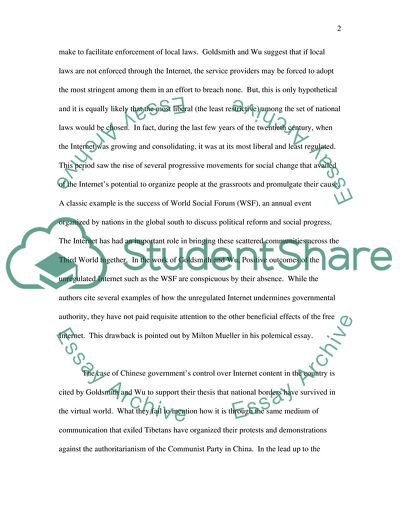
- Home
- Free Samples
- Premium Essays
- Editing Services
- Extra Tools
- Essay Writing Help
- About Us
- Studentshare
- Subjects
- Miscellaneous
- Are we all better off in a world where the Internet does not affect states control of what happens inside their borders
Are we all better off in a world where the Internet does not affect states control of what happens inside their borders - Essay Example

- Subject: Miscellaneous
- Type: Essay
- Level: Undergraduate
- Pages: 4 (1000 words)
- Downloads: 0
- Author: cummeratafleta
Extract of sample "Are we all better off in a world where the Internet does not affect states control of what happens inside their borders"
The flip side of this localization is that the Internet is no longer the vehicle of free-speech and expression that it once was. Jack Goldsmith and Timothy Wu argue in their book ‘Who Controls the Internet? Illusions of a Borderless World’ that this transformation of the cyberspace is for the better, where as Milton Mueller disagree with this view. Both sides have strong and weak points in support of their positions. The rest of this essay will evaluate the merit of these arguments in an attempt to choose between these two positions.
The scholar team of Goldsmith and Wu has to be credited for disillusioning a few myths associated with the internet. They show, through empirical evidence, how the content in the Internet can be successfully controlled. A particular case they peruse in support of their argument is the drastic concessions that Yahoo Inc. was compelled to make to facilitate enforcement of local laws. Goldsmith and Wu suggest that if local laws are not enforced through the Internet, the service providers may be forced to adopt the most stringent among them in an effort to breach none.
But, this is only hypothetical and it is equally likely that the most liberal (the least restrictive) among the set of national laws would be chosen. In fact, during the last few years of the twentieth century, when the Internet was growing and consolidating, it was at its most liberal and least regulated. This period saw the rise of several progressive movements for social change that availed of the Internet’s potential to organize people at the grassroots and promulgate their cause. A classic example is the success of World Social Forum (WSF), an annual event organized by nations in the global south to discuss political reform and social progress.
The Internet has had an important role in bringing these scattered communities across the Third World together. In
...Download file to see next pages Read MoreCHECK THESE SAMPLES OF Are we all better off in a world where the Internet does not affect states control of what happens inside their borders
Illegal Immigration's Destructive Impact on the Economy of the United States of America
Functionalist and intentionalist explanations of mass murder cases
The National Budget Deficit of the United States of America
Why Pet Stores Are Among the Few Retail Businesses Growing in the Economic Downturn
Latest Moral Issue in Intelligence Operations: How Far Can We Go to Uncover Secrets
Why the Enlargement of EU is Beneficial for the Economy of the Member States and EU as a whole
The Role of Corporate Governance in Developing Economy
The Role of the European Union Single Market for the Development of International Business

- TERMS & CONDITIONS
- PRIVACY POLICY
- COOKIES POLICY